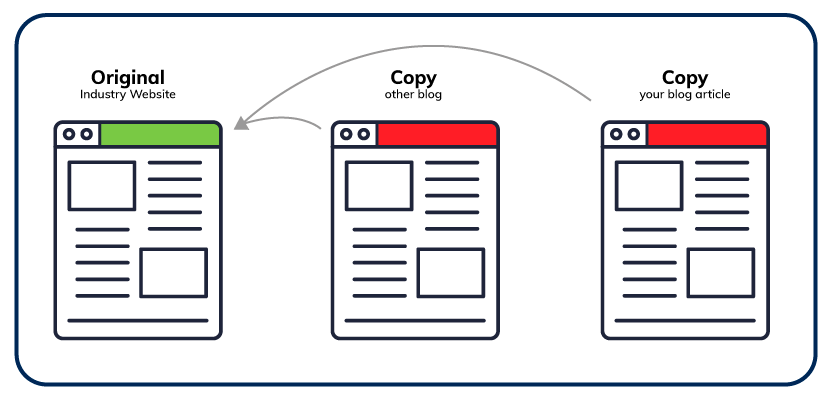[display-name-category]
[post_author]
[wtr-time]
If you’re familiar with SEO, you’ve encountered the term “duplicate content” many times with different opinions. One of the most common beliefs about duplicate content is that it harms your SEO strategy. For this reason, many website owners constantly worry about duplicate material.
Well, you can relax a bit. While duplicate content is not the worst thing that can happen, it can hurt your SEO strategy. Let’s put it this way: duplicate content makes up 25–30% of the web’s content, so it’s more common than you might think. But the whole point of SEO is to make your website stand out, so it’s useful to know how to avoid and fix duplicate content issues.
Now, before we go into how to address it, let’s first define duplicate content and how it affects search engine rankings.
What Is Duplicate Content?
The term “duplicate content” refers to content that is posted in more than one location online. In other words, duplicate content happens when the same text can be found at more than one URL. This text can range from a product description to an entire page.

Even if it doesn’t technically end with a penalty, duplicate content may impact search engine rankings. Search engines have a hard time determining which version of content is most relevant to a particular search query when many pieces of content are significantly similar in more than one place.
How This Affects Your SEO Efforts
You Risk Ranking
If the same text appears on multiple URLs, Google may decide to rank a version of your content that you didn’t want to rank. This means that a version of your content may end up ranking even if it’s not the most relevant or updated.
You Risk Losing Traffic
Search engines must decide which to put on top of their results if they run into multiple versions of the same page. They usually choose the original content source and de-index other versions to do this. Any version apart from the original will not be served in search results, which translates to a loss of potential organic traffic.
Changes or Declines in Site Metrics
If you’re unaware of your duplicate content issues, this can lead to changes in site metrics such as traffic and conversions. This means that the wrong page may be getting indexed for a keyword or phrase you want to rank for, leading to a decrease in organic search visitors.
How to Prevent and Address Duplicate Content
Check Your Site’s Structure
The first step is to understand the structure of your website. This will help you identify any areas where there may be duplication and help you better understand how your content is structured.
Rethink Your Content Strategy
Once you’ve identified any areas of duplicate content, you must rethink your content strategy. You can create a sensible strategy that minimizes duplication by organizing your information into topic clusters. This way, you can create content that interlinks with other relevant pieces, allowing Google to better understand your website’s structure and context.
Rel=”Canonical”
Using the rel=”canonical” attribute is among the most effective methods to manage duplicate content. It is a small snippet of HTML code that tells search engines which version of the page they should rank. Using rel=”canonical” lets Google know which URL is the canonical (original) version.
301 Redirect
You can set up a 301 redirect from the duplicate page or pages to the source so that search engine crawlers recognize it as the authoritative version. This will also ensure no link juice is wasted on internal duplicate content pages and all link strength goes towards your original sourced page.
Work on SEO Friendly Content
SEO-friendly content is more than just writing for the search engine. It’s about ensuring your content speaks to human readers and search engine bots. Creating readable, useful, and relevant content for your target audience will help you rank higher in search engine results.
To ensure your content is SEO-friendly, use keywords and phrases related to the page’s topic, use easy-to-read language, create original content with a focus on quality, and make sure the content is relevant to your target audience.
Why Is Content So Important in SEO?
Content plays a vital role in SEO because it is the main factor that search engine crawlers use to recognize what your website is about. Through content, crawlers can understand your site’s context and its meaning. They then use this information to determine which pages should be ranked for certain queries.
Content can also help you rank higher if it is well-written, relevant to your target audience, and contains keywords related to the page’s topic. The content indicates what your website offers and helps search engine crawlers recognize that it is an authoritative source on a particular subject. This will improve site visibility in organic search results and help you gain more traffic from potential customers.
So, ensuring unique content across your web pages is essential for SEO success. Duplicate content can cause ranking issues and missed opportunities for increased organic search traffic. By reviewing your website structure and content strategy, you can ensure that all your pages are unique and optimized for SEO success.
Make Sure Your Site Has Original, Engaging Content
The importance of content writing in SEO cannot be overstated. If you want your website to stand out from the competition, you need interesting and original content. This will help boost search engine rankings and capture the attention of users.
Whether you need to rephrase and update old content, create new content from scratch, or use a combination of both, an experienced SEO strategist can help you develop an effective solution for duplicate content problems.
If you need help with your digital marketing efforts, White Shark Media can assist you in creating an effective content strategy that will help increase your visibility online and bring more organic traffic to your website. Check out our blog to learn more about content writing and SEO.






